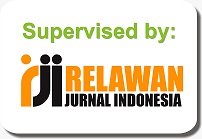Hubungan religiositas dengan social media addictions pada mahasiswa Universitas Muhammadiyah Prof. Dr. Hamka
Abstract
Excessive social media use among students has been linked to detrimental impacts on mental, physical, and academic well-being. This study investigated the relationship between religiosity and social media addiction among 102 college students Universitas Muhammadiyah Prof. Dr. Hamka. Employing an accidental sampling technique, data were collected using the MUDRAS religiosity scale and a modified social media addiction scale. Data analysis was carried out using the Pearson correlation test in SPSS 20. Pearson correlation analysis revealed a significant negative correlation (-0.212) between religiosity and social media addiction, suggesting that higher levels of religiosity are associated with lower levels of social media addiction. These findings support the notion of religiosity as a potential protective factor against this prevalent issue. Future research should explore this relationship in greater depth to develop effective prevention and intervention strategies
Downloads
References
Agung, I. M., & Sahara, D. (2023). Validitas Konstrak Skala Kecanduan Media Sosial. Psikobuletin:Buletin Ilmiah Psikologi, 4(2), 76. https://doi.org/10.24014/pib.v4i2.21746
Akbar, M. F. (2023). Social media addiction and Bedtime Procrastination in Students Kecanduan Media Sosial dan Bedtime Procrastination Pada Siswa. 12(3), 309–315.
Anggun, S., & Supriyadi. (2020). Hubungan Penggunaan Media Sosial, Religiusitas Dengan Agresifitas Mahasiswa Fakultas Ilmu Kesehatan Universitas Muhammadiyah Purwokerto. Jurnal Keperawatan Muhammadiyah, 1(2), 230–237. http://103.114.35.30/index.php/JKM/article/view/5222
Aulia, W., Maputra, Y., Afriyeni, N., & Sari, L. (2022). Hubungan Religiusitas dengan Kontrol Diri dalam Penggunaan TikTok pada Remaja. Jurnal Psikologi Udayana, 9(2), 118. https://doi.org/10.24843/jpu.2022.v09.i02.p02
Bahri, M., Kholidin, F. I., & Yandri, H. (2024). The impact of self compassion and emotion regulation on social anxiety in college students. KONSELI: Jurnal Bimbingan dan Konseling (E-Journal), 11(1).
Dwi Marsela, R., & Supriatna, M. (2019). Kontrol Diri: Definisi dan Faktor. Journal of Innovative Counseling : Theory, Practice & Research, 3(2), 65–69. http://journal.umtas.ac.id/index.php/innovative_counseling
Fauziah, R. N., Nurpratiwiningsih, L., & Toharudin, M. (2024). Analisis Penggunaan Aplikasi Tiktok Terhadap Konsentrasi Siswa di SD Negeri Brebes 01. Jurnal Ilmu Pendidikan Sekolah Dasar, 2(11), 127–136.
Juliawati, D., Yandri, H., Sujadi, E., & Ahmad, B. (2020). Pemantapan Tauhid Remaja Masjid Melalui Kegiatan Layanan Bimbingan Kelompok. E-Dimas: Jurnal Pengabdian kepada Masyarakat, 11(3), 323-329.
Hendra, Z., Yandri, H., & Harmalis, H. (2021). Analisis Kontrol Diri Siswa Saat Belajar dari Rumah dalam Menggunakan Handphone pada Masa Pandemi COVID-19. Indonesian Journal of Counseling and Development, 3(2), 86-93.
Liu, C., & Ma, J. (2018). Personality and Individual Di ff erences Development and validation of the Chinese social media addiction scale. Personality and Individual Differences, 134(May), 55–59. https://doi.org/10.1016/j.paid.2018.05.046
Marcus, Z. J., & McCullough, M. E. (2021). Does religion make people more self-controlled? A review of research from the lab and life. Current Opinion in Psychology, 40, 167–170. https://doi.org/10.1016/j.copsyc.2020.12.001
Pranikah, S., Di, R., & Samarinda, M. A. N. (2019). Hubungan Religiusitas Dan Kontrol Diri Dengan Perilaku. Jurnal Psikologi. 1(3), 126–131.
Prasetyo, R., Bhayangkara, B. (2024). Hubungan antara pola makan dan tingkat konsentrasi dalam belajar pada mahasiswa. 4(3), 257–263.
Rafiola, R. H., Alfaiz, A., Yuzarion, Y., Yandri, H., Awlawi, A. H., & Saputra, R. (2023). Behavior Modification Psychosynthesis vs Spiritual Perspective: A Comparative Synthesis Analysis of Counseling Approaches. Indonesian Journal of Counseling and Development, 5(2), 108-119.
Romlah, S., & Rusdi, R. (2023). Pendidikan Agama Islam Sebagai Pilar Pembentukan Moral Dan Etika. Al-Ibrah : Jurnal Pendidikan Dan Keilmuan Islam, 8(1), 67–85. https://doi.org/10.61815/alibrah.v8i1.249
Shata, N. I., & Wilani, N. M. A. (2019). Pengaruh Religiusitas terhadap Kecerdasan Emosi pada Siswa Perempuan SMA Muhammadiyah 1 Denpasar. Jurnal Psikologi Udayana, 000, 165–175.
Sholihah, W., & Allenidekania, I. N. R. (2022). Faktor Yang Mempengaruhi Orang Tua Memberikan Gadget Pada Anak. Keperawatan Silampari, 5(8.5.2017), 2003–2005.
Sun, Y., & Zhang, Y. (2020). A Review of Theories and Models Applied in Studies of Social Media Addiction and Implications for Future Research. Addictive Behaviors, 106699. https://doi.org/10.1016/j.addbeh.2020.106699
Suryadi, B., Hayat, B., & Putra, M. D. K. (2020). Evaluating psychometric properties of the Muslim Daily Religiosity Assessment Scale (MUDRAS) in Indonesian samples using the Rasch model. Mental Health, Religion and Culture, 23(3–4), 331–346. https://doi.org/10.1080/13674676.2020.1795822
Zivnuska, S., Carlson, J. R., Carlson, D. S., Harris, R. B., Harris, K. J., Zivnuska, S., Carlson, J. R., Carlson, D. S., & Ranida, B. (2019). Social media addiction and social media reactions : The implications for job performance. The Journal of Social Psychology, 159(6), 746–760. https://doi.org/10.1080/00224545.2019.1578725
Copyright (c) 2024 Wike Nur Peni, Ilham Mundzir

This work is licensed under a Creative Commons Attribution 4.0 International License.








